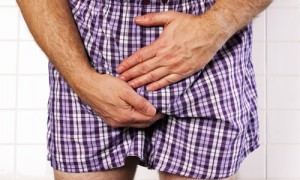Genital sores refer to ulcers on a male’s penis or scrotum. Ulcers or sores form when the surface of the skin has broken down due to an underlying cause. Genital sores can also spread to the region around the anus. Causes for genital sores include chancroid syphilis, skin injury and herpes genitalis.
A person with genital sores may experience symptoms depending on the underlying cause. Symptom that occur with genital sores include ulcers or skin lumps on the genital, genital pain, penile ulcer, penile discharge, penile 
Treatment for genital sores depends on the underlying cause of the condition. Treatment may include oral antibiotics, oral antiviral medication. Topical antibiotics, topical antiviral medication, cold compresses, warm compresses, topical corticosteroids and nonsteroidal anti-inflammatory medication to treat pain.
Signs and symptoms
Signs and symptoms of genital sores include:
- Skin ulcers on the scrotum or penis that do not go away
- Skin lumps on the scrotum or penis
- Genital pain or penile pain
- Genital tenderness
- Swollen glands in the groin
- Penile discharge
Causes
Causes of genital sores in males include:
- Chancroid
- Bowen’s disease
- Genital warts
- Herpes genitalis
- Molluscum contagiosum
- Penile cancer
- Syphilis
- Skin injury
- Skin abscess
Treatment
Treatment for genital sores depends on the underlying cause of the condition. Treatment may include oral antibiotics, oral antiviral medication. Topical antibiotics, topical antiviral medication, cold compresses, warm compresses, topical corticosteroids and nonsteroidal anti-inflammatory medication to treat pain.
Treatment for genital sores in males includes:
- Oral antibiotics for genital infections
- Oral antiviral medication for genital infections
- Topical corticosteroids to reduce inflammation
- Cold and warm compresses
- Nonsteroidal anti-inflammatory medication for pain, narcotic pain medication for moderate to severe pain for short-term use only
Homecare treatment
Homecare treatment for genital sores may include:
- Avoid having sexual intercourse with your partner until therapy has been fully completely
- Use topical corticosteroids for itching
- Avoid sexual intercourse with partners having abnormal vaginal discharge
- Avoid having sex with anyone with oral or genital sores
- Practice sex with protection – use condoms and avoid sex with multiple partners or with a person who has sex with multiple sexual partners
- Acetaminophen for pain
- Nonsteroidal anti-inflammatory medication for pain
- Take medication as directed by your health care provider
When to seek medical attention
See your doctor if any of the following problems occur along with genital sores:
- Fever of 103 degreed F or above or shaking chills
- Drainage of mucus from the pens
- Pain while urinating
- Worsening sores on the genitals
- Swollen glands in the groin
Prevention
- Avoid sex with multiple sexual partners
- Avoid sex with a person with multiple sexual partners
- Avoid sex with a person with oral or genital sores
- Avoid sexual contact with a person with vaginal or penile discharge
- Practice sex with protection
Related Video
http://www.youtube.com/watch?v=StDiZuO8_AA
